Not drinking this holiday season? No problem
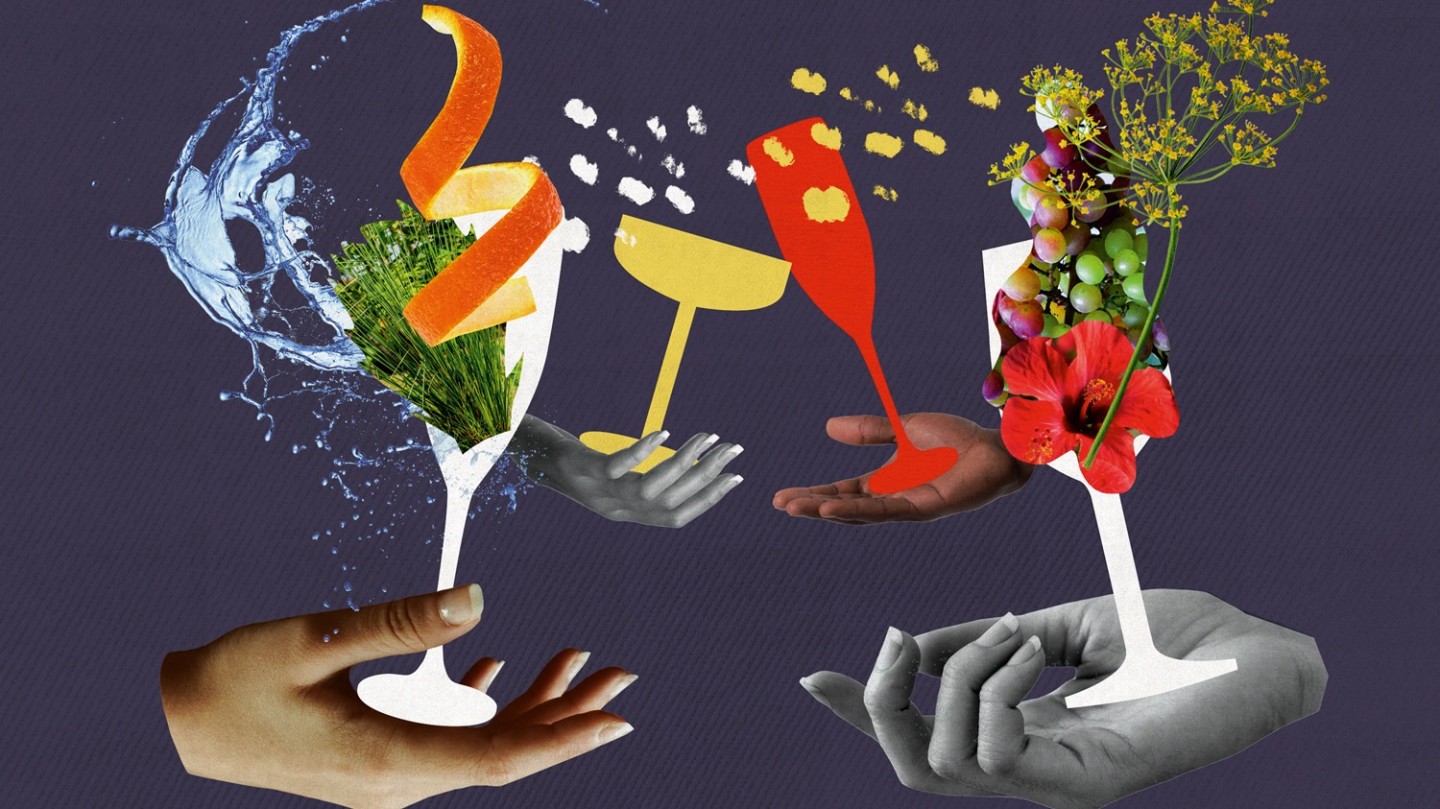
Roula Khalaf, Editor of the FT, selects her favourite stories in this weekly newsletter.
“I’d hate to be a teetotaller,” the singer Dean Martin once quipped. “Imagine getting up in the morning and knowing that’s as good as you’re going to feel all day.”
Waking up without a hangover feels pretty bloody amazing, if you ask me. But it’s true: if you’re in the habit of toasting six o’clock with a twinkly G&T, or seeing off a brutal week with a glass or two of champagne, the prospect of an alcohol-free life – particularly at Christmas time – can seem a little depressing.
Yet more and more of us are taking the plunge. One in five adults in the UK claims to be teetotal. Among 16 to 24-year-olds, it’s closer to one in four. And growing numbers are choosing to drink less, and less often.
The result has been a non-alc gold rush. All of a sudden, the market is awash with sin-free botanical “spirits”, zero-abv beers, teetotal cocktails, adult sodas and alternative highs. Everyone, from global drinks giants like Heineken and Diageo to tiny artisan companies in Hackney and Brooklyn, it seems, is now courting the sober-curious.
That’s the good news. The bad news is that most of these new products aren’t great. And that’s because making sophisticated non-alcoholic drinks is difficult. Alcohol gives drinks texture, body and length. It helps to lock in flavour and release aroma. Take it out of the equation, and you can easily wind up with a drink that tastes like a bath bomb and goes down like gruel.
There are, however, a few newcomers that are worth seeking out. Aecorn Aperitifs – a sister brand to Seedlip, which launched the eponymous non-alcoholic botanical “spirit” – offers a trio of elixirs that pay homage to Italian aperitivi. Made from a blend of verjus (tart, unripe grape juice), herbs, roots and botanicals, the Aecorn range includes a herbal white aperitif a bit like a dry vermouth; a smoky-sweet, aromatic aperitif that’s not dissimilar to a rosso; and a cardinal-red bitter that bears a strong resemblance to Campari. This last one is my favourite – coruscatingly bitter and zesty, it really scratches the itch, especially when mixed with tonic.
Another noteworthy non-alc is Everleaf. Created by conservation biologist-turned-bartender Paul Mathew, this golden aperitif is flavoured with 18 botanicals, including saffron, vetiver, orange blossom and voodoo lily, which give it an exotic, cedar-y aroma that makes me think of temples and saunas. If you could bottle the scent of wellness, this would probably be it. It can be sipped neat over ice, but I think it’s best with tonic or soda, and a slice of citrus.
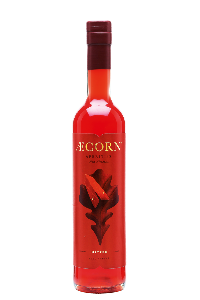
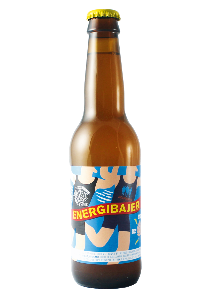
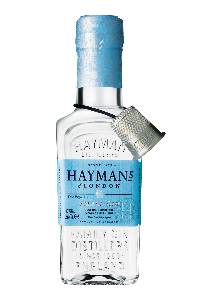
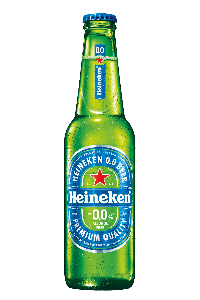
If you like bittersweet Italian amari like Cynar or Montenegro, then 0 per cent abv The Bitter Note will be right up your street. Dark as chocolate and richly spiced, it’s virtually indistinguishable from the real thing – serve on the rocks with a twist of orange peel.
All three of these products – along with more than 30 other zero-abv spirits, aperitifs, wines and beers – are on the extensive non-alc list at Albie, the lobby bar and restaurant at Southwark’s buzzy new Hoxton hotel. “People do a lot of networking and meetings in our hotels,” says The Hoxton, Southwark’s head of bars Gabor Fodor, “so we felt it was important to offer a really good drinks list that was non-alcoholic, but was also still fun and delicious. There’s definitely much more of a focus on wellness now – we recently had an American guest who told us he booked for a week specifically because of our focus on non-alcoholic drinks.” Albie offers 14 non-alcoholic cocktails in all, including a remarkably good pseudo-Negroni (made with Aecorn Bitter) and “Daiquiri” that’s very passable too. The signature drinks are also worth a try, even if you’re not on the wagon – Just Peachy, made with Seedlip Garden, white peach and jasmine, is quite heavenly.
Growing demand for temperance drinks hasn’t stifled bartender creativity – far from it. At hip New York cocktail joint Existing Conditions, culinary whizz and Momofuku collaborator Dave Arnold laces his non-alc cocktail list with all sorts of esoteric flavours and textures: carbonated leatherwood honey, spruce tea, clarified peaches and sweet-and-sour umeboshi. Each drink is such an out-there taste sensation, you end up forgetting about alcohol altogether.
Back in London, at the innovative Tayer + Elementary bar in Old Street, non-alcoholic cocktails are also an integral part of the food and drink offering created by multi-award-winning bartenders Monica Berg and Alex Kratena. “I grew up in Norway, where there is much more of a culture of pairing food with non-alcoholic options on an equal basis, so creating cocktails that don’t have alcohol as the focus feels really natural to me,” says Berg, who was recently crowned Bartenders’ Bartender at The World’s 50 Best Bars awards. “There are so many other ways you can bring interesting flavours, aromas and textures to a drink.”
At Elementary – the more high-energy bar out front – wickedly boozy classics sit alongside soft drinks created specially for the bar, including a hemp kombucha from Jarr and a seasonal house soda. Out the back at Tayer – a bar/restaurant hybrid with the energy of a test kitchen – guests can nibble small plates from Tata Eatery while drinking non-alcoholic cocktails, including a highball made with tonic, fennel and the Mexican herb hoja santa. On my last visit I rounded off a well-oiled dinner with a teetotal cocktail of matcha, chocolate and white pepper cordial that had all the satisfying weight and texture of a digestif. The non-alc drinks here are so interesting and tempting, I’ve found, you want to try them regardless of whether you’re drinking or not – which is surely an achievement.
There are times when the temperance movement can be easy to mock – Whyte & Mackay recently launched a half-strength Scotch “whisky”, which tastes exactly like what it is – whisky that’s been watered down (an innovation that calls to mind the immortal words of Little Britain’s FatFighters: “It’s got half the calories, so you can eat twice as much!”).
Rather more ingenious is the new Small Gin from heritage gin distiller Hayman’s. Bottled at 43 per cent abv, Small Gin is the same strength as a normal gin, but the botanical concentration is five times stronger – so you only need a thimbleful to make a pretty convincing G&T that clocks in at just 0.2 units. Not quite alcohol-free, but well on the way.
When I’m not drinking alcohol, the thing I drink most often is non-alcoholic beer. And there is a huge choice of really good non-alcoholic beers now on the market. My current favourite is the dry-hopped ale from Germany’s Clausthaler brewery – it’s crisp and refreshing, but it’s got real bite and body too. I’m also a big fan of Denmark’s trendy Mikkeller brewery, which produces a whole array of no/lo brews, including a wheat beer, Energibajer, that’s actually sold as a post-run recovery drink.
If you can tolerate just a smidge of alcohol, then the 2.1 per cent abv lager (£15 for six) from Small Beer Brew Co, a craft brewery in Bermondsey, is excellent (and the packaging is also very smart). Even Heineken 0.0 is not too bad: nice enough to take the edge off, but not so nice you start thinking how nice actual beer is, if you know what I mean.
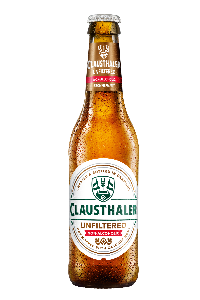
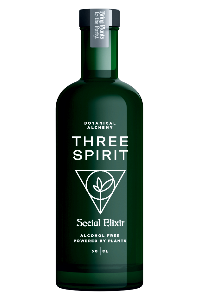
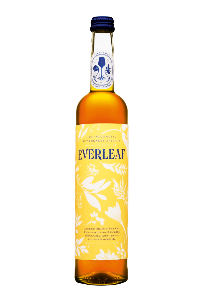
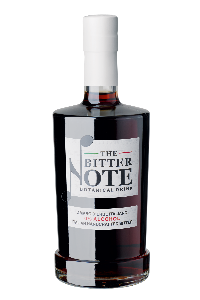
All non-alcoholic wines are horrible, and I’m afraid I can’t see that changing any time soon. If you want a booze-free drink that has provenance and complexity and also goes well with food, then a much better option would be tea. The Michelin-starred Clove Club in Shoreditch offers an eight-course tea and food pairing menu that’s absolutely exquisite. Matches created by chef Isaac McHale and drinksman Rob Simpson include sardine sashimi with white peony tea; pork and hispi cabbage with a smoky lapsang souchong; and a dessert of strawberries and meadowsweet custard, paired with a sparkling, osmanthus-scented long Jing.
Some people eschew alcohol because they want a clear head. But there are plenty more of us who still yearn for the buzz of alcohol. And there is now a nascent market in psychoactive herbal drinks that purport to offer exactly that. One brand that’s been causing a stir stateside is Kin, whose self-described “euphorics” are spiked with nootropic ingredients including GABA, 5-HTP and citicoline, plus some more cuddly-sounding botanicals, including hibiscus and gentian. I had a triple dose of High Rhode, and I must say I didn’t feel a thing. (It also tastes like a malaria pill.)
I’ve had a similar experience so far with CBD – the cannabis extract many drinks companies are adding (quite legally, for now, at least) to everything from soda and gin to pale ale. I’ve tasted a lot of these products, and so far not one has moved the dial.
My experience with Three Spirit was a bit different. Its Social Elixir botanical drink is infused with plants and fungi often associated with ritual and meditation: yerba mate, lion’s mane, tulsi and damiana. It leaves something to be desired in the flavour department – it tastes like a rather murky craft cola. But I found the effect, while quite subtle, most pleasant. A double measure left me feeling a bit like I’d drunk a nip of whisky.
For abstainers, there is also always the promise of Alcarelle, the much-publicised “alcohol substitute” being developed by a team headed up by Professor David Nutt, director of the Neuropsychopharmacology Unit at Imperial College London and former chief drugs adviser to the UK government. If the company is to believed, this elixir will, when it’s perfected, impart all the pleasure of a glass of champagne without any of the dependency, mood swings, impaired judgement, liver damage or hangovers commonly associated with alcohol. It sounds too good to be true, and for the time being, it is. I’m told it will take many more years of research (and millions of pounds of investment) before Alcarelle becomes a commercial reality.
There’s always the possibility, of course, that by the time Alcarelle is ready, we won’t even need it any more: the last generation of alcohol drinkers will be in the grave, hangovers will be extinct and the three-martini lunch… well, that will just be the stuff of myth. And that is a sobering thought.
Comments